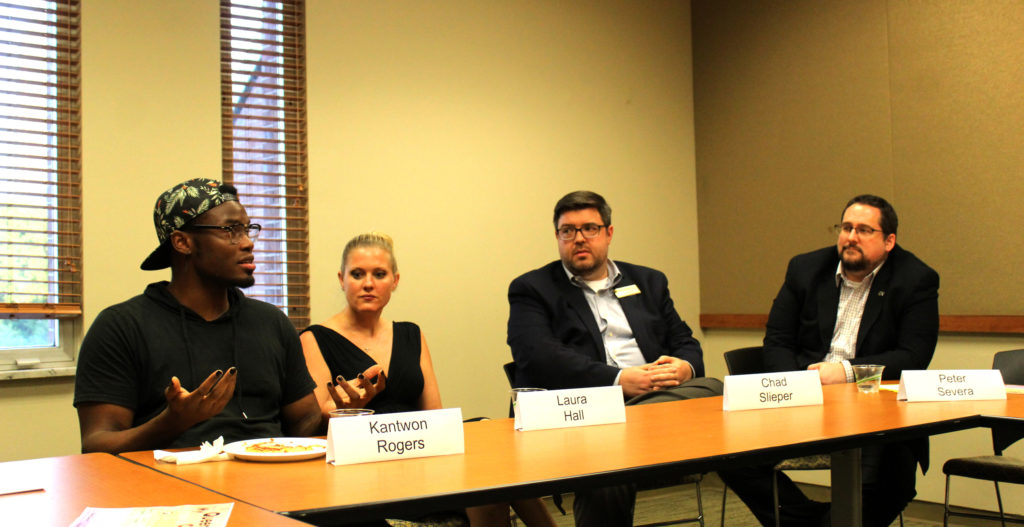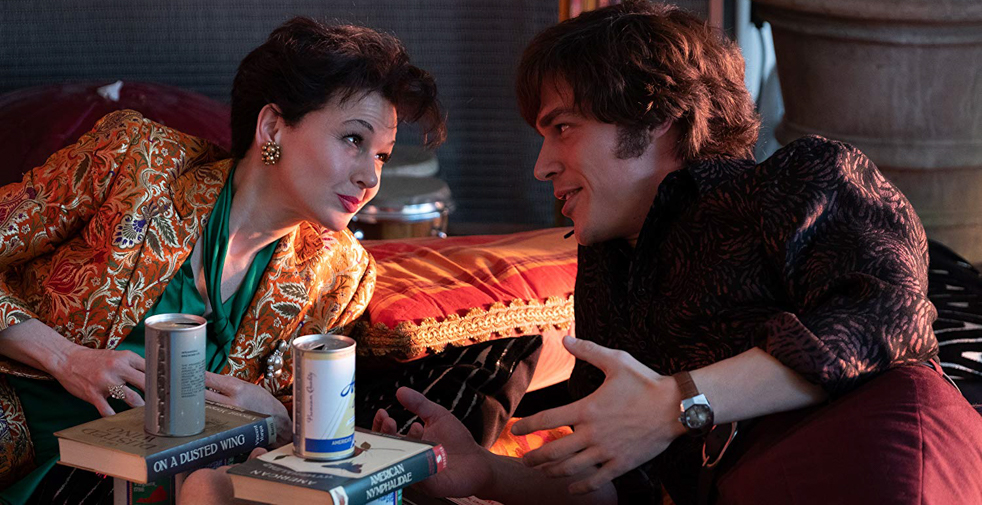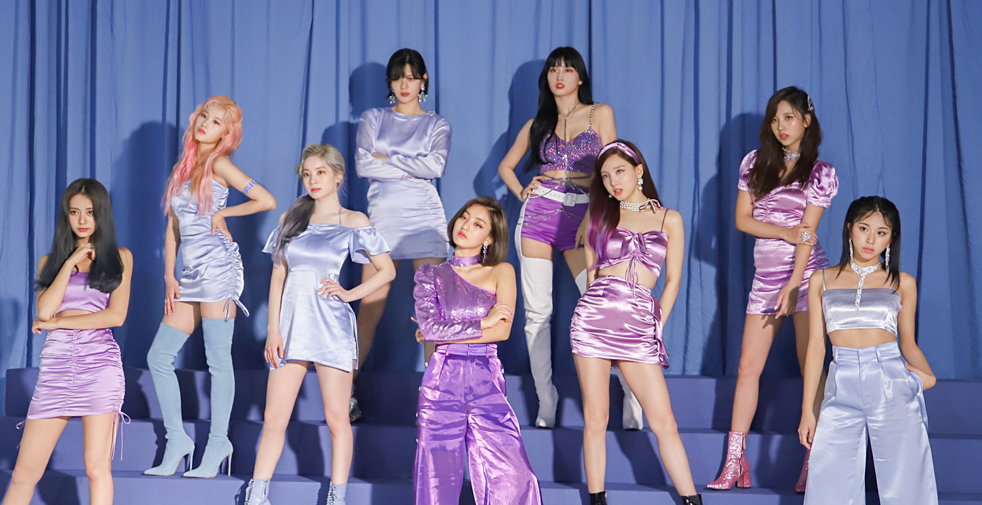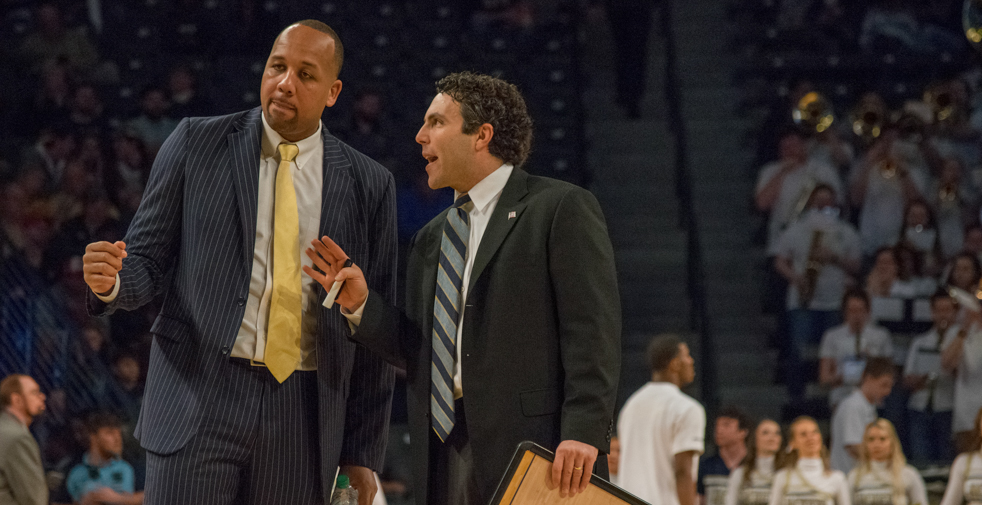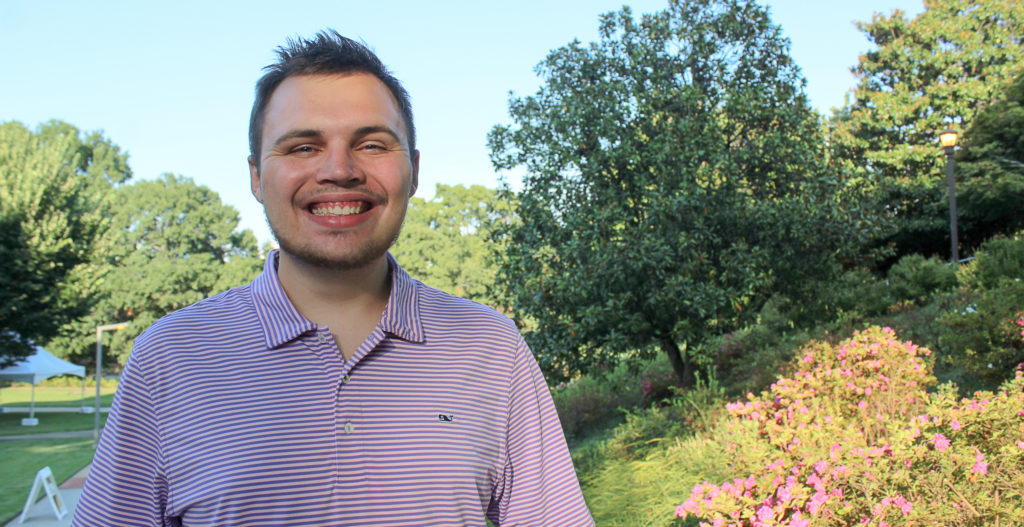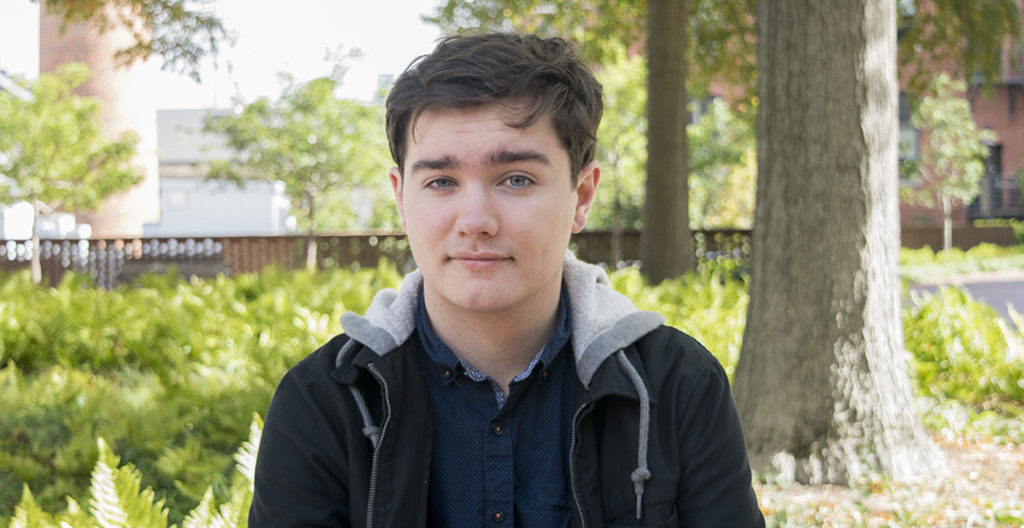Posted on 08 October 2019.
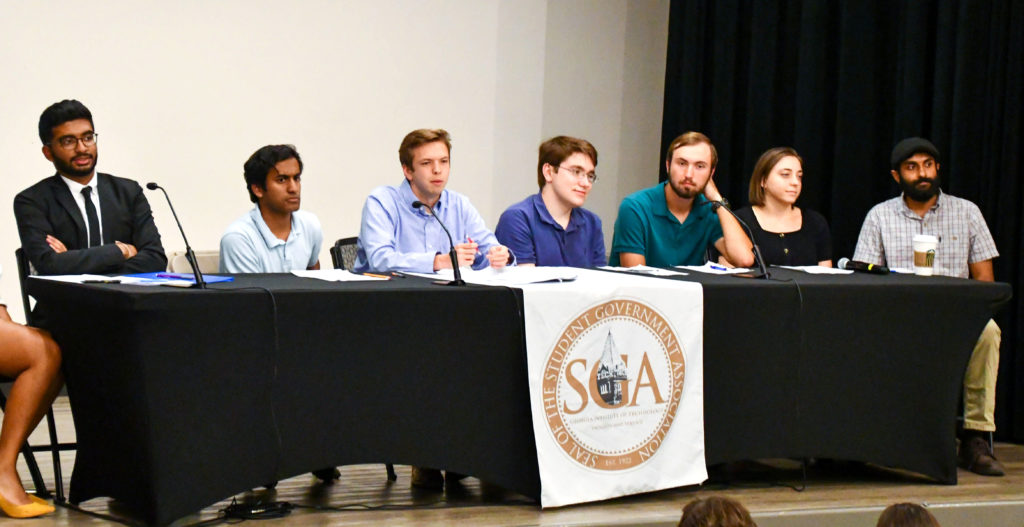
The Wreck the Vote Debate is an event sponsored by SGA and the Nu Mu Chapter of Alpha Phi Alpha inc. during the annual week-long event, Wreck The Vote. The goal for this initiative is to encourage students to register to vote and to be politically active.
The debate was set up in a format of two rounds, one pertaining to national issues and the other pertaining to state issues. During each round, there were three prompts on which each of four student organizations were allowed to state their stance. These organizations included College Democrats (CD), College Republicans (CR), Young Americans for Liberty (YAL) and Young Democratic Socialists of America (YDSA). After each group made their arguments, an eight minute rebuttal period began where any team could take the floor to dispute the other groups’ claims. Two fact-checkers were on sight in case any debaters wanted to call out another team for inaccuracies, as well as two moderators to ensure the event ran smoothly.
Below is a summary of the topics covered during the Wreck the Vote Debate.
Major Players
Moderators: Shekinah Hall & Samuel Elis
College Republicans (CR): Jacob Chambers & Sidharth Eleswarpu
Young Americans for Liberty (YAL): Ethan Offenbacher & Andrew Babbitt
College Democrats (CD): Abhishek Khandal & Nishat Firoj
Young Democratic Socialists of America (YDSA): Nikhil Pailoor & Ariella Ventura
Healthcare
College Democrats showed overwhelming support for Medicare for all, but mentioned a government aided transition from private healthcare to a public healthcare system. College Republicans argued in favor of health savings accounts, meaning that, instead of paying premiums for health insurance, a person would pay into a savings account specifically reserved for medical expenses. The idea revolves around keeping money in Americans’ pockets, and YAL had similar thoughts. The latter encouraged fostering a c ompetitive healthcare market in addition to the use of health savings accounts. YDSA, like CD, supported medicare for all with no room for negotiation.
Gun Control
CR started their statements with wholehearted support of a mental health-based approach to gun control and were strongly in favor of red flag laws. YAL also supported mental health-based approach and red flag laws, stating, however, that the importance of gun control issues was “somewhat exaggerated.”
YDSA followed their statements with denouncing white supremacy, then argued for proper gun registration. The representatives also brought up instances of weapons from the U.S. being smuggled across the border into South America for the purpose of encouraging lawful gun ownership and government-mandated weapon registration.
“Down south of the border there is a drug war that has claimed hundreds of thousands of lives,” Piloor said. “The cartels responsible for much of this get their most powerful weapons through legal sales in the U.S. that are then taken to the black market, smuggled across the border and used to escalate this kind of violence. This is something that the gun industry has profited on and there is a clear amount of data that shows that this originated from the end of the assault weapons ban.”
CD supported banning AR-15s outright, and spoke on the possible benefits of gun buyback programs. In regards to ignoring certain statistics that could potentially misrepresent U.S. gun fatality rates, Khandal said, “We can take statistics and warp them to make ourselves look comparable, but being comparable is not good enough.”
Immigration
All organizations believed that there should be a pathway to citizenship for illegal immigrants currently in this country.
YAL and CR supported securing borders, CR calling for more physical and digital security. They brought up a program called E-Werify, a web-based system able to confirm the employment eligibility of any worker in the United States. Babbitt said, “A lot of these [immigration] initiatives don’t make sense because it is unfeasible to move all these people back to their countries of origin and also immoral. What we need to be doing is created a way for them [immigrants] to legally integrate into society and we should also be securing the border so we don’t have to repeat this every ten to fifteen years. This is a two-pronged approach: we need to create a pathway for illegal immigrants that are already here to become legal residents and we need to limit as much as possible the influx of illegal immigrants into the United States.”
YDSA responded in favor of banning ICE. CD discouraged the banning of ICE altogether because of the group’s other essential duties, but spoke against the current actions of the group. CD also called for the immediate legalization of immigrants and for DACA to be reinstated.
A sudden comment from an audience member accused members of CD of “hate speech” when they brought up white privilege as it pertains to advantage in American society. The moderator quickly shut down the commentator, as audience participation was not allowed during the event.
Intermission
During the intermission the Technique spoke to two of the participating debaters. Ventura, spoke about her family’s personal experiences of persecution in Chile.
“Politics is personal,” she said, in hopes to demonstrate the severity of the immigration crisis through her own story.
Khandal responded to the hate speech accusation. “I think it’s an overgeneralization, and rather ignorant, of the fact of what’s going on in this country. Just to reiterate, in the justice system white people often receive less severe sentences, they are more likely able to afford lawyers, and often their cases get thrown out. It’s not against white people — it’s about pointing out that there are problems with the current justice system we have and that people of color are unfairly targeted.”
Religious Freedom
To preface the question, the moderators brought up the Religious Freedom Restoration Act. Each debater agreed that the bill was unnecessary, as religious freedom is already protected under the first amendment. During the rebuttal period, a debate ensued over whether it is acceptable to refuse a customer on the basis of religious belief in reference to the case of a Christian woman refusing to bake a wedding cake for a gay couple on the basis of religious belief.
YDSA stated that the bill promoted discrimination and brought up that LGBTQ+ people are an unprotected minority group in the state of Georgia. The group also argued against refusing to make a “gay wedding cake.”
“People have been denied essential services because of their identities. Back during the days of segregation, there were world-renowned jazz musicians that died because they were injured, they went to a hospital, and the hospital didn’t serve black people. In theory, you could use boycotts or really targeted campaigns to stop it but in practice, we haven’t really seen that work which is why I think we should have protections enshrined in law,” Pailoor said. He then called for a fact check on the status of legal protections of LGTBQIA people in the state of Georgia. Currently, there are none.
YD argued that the bill promoted homophobia and, similar to YDSA, was strongly opposed to refusing services on religious belief. CR chose to side with Governor Deal and claimed the bill was unnecessary. The group was in favor of a person or business’ right to refuse a customer based on religious belief with the “gay wedding cake” as the example. YAL was also against the bill, and was in favor of a person or business’ right to refuse a “customized good” as opposed to an essential good.
Private Prisons
All groups were against private prisons because of their cost-ineffectiveness and “immoral” nature. A debate broke out over whether or not prison labor is akin to modern-day slave labor. YDSA and CD argued that it was, as they are paid pennies on the dollar, and in one state, not at all. CR and YAL claimed that prison labor was not the same as the atrocities of slavery. While there was a general consensus on all parties being against private prisons, no consensus was reached over the morality of prison labor.
The Heartbeat Bill
The topic of abortion incited heated debate over, not only whether or not it should be legal, but when exactly life begins. CR stated abortion is morally wrong and life begins at conception.
“The Democratic Party’s position on abortion is that abortion should be quote ‘Safe, Legal, and Rare.’ Why rare?” Eleswarpu asked. “If abortion isn’t morally wrong why should it be rare? That statement acknowledges that abortion is not some regular healthcare procedure and acknowledges that the living thing is an unborn child that has value.”
YAL argued that life begins at conception and abortion should be totally illegal. YAL also declared that Roe vs. Wade should be overturned and the decision of whether or not abortion should be legal should fall on the responsibility of state governments.
YDSA replied that abstinence-only sex education Georgia needs to end, and that proper sex education to be a requirement. The group brought up that abortion is a woman’s choice and should, therefore, be legal and covered by Medicare for all.
CD responded that Georgians need safe-sex education and concluded that abortion should be legal.
Post-debate
The Technique touched base with moderator Shekinah Hall (undergrad PUBP). “[I] think the debate went really well. We definitely touched on some controversial issues, in that people had different opinions on social issues and economic issues … We wanted to do that because college is a time to really explore our differences in a respectful way, and understand where the opposite side is coming from. We were glad to provide a platform for everyone’s ideas and to let people come and share.”
Registration to vote in Georgia closes on Oct 7. Readers can find a blank voter registration form on page nine in the Life section.
Editor’s Note:
An earlier version of this story did not include correct sponsorship information for the Wreck the Vote debate. The article has since been corrected.



